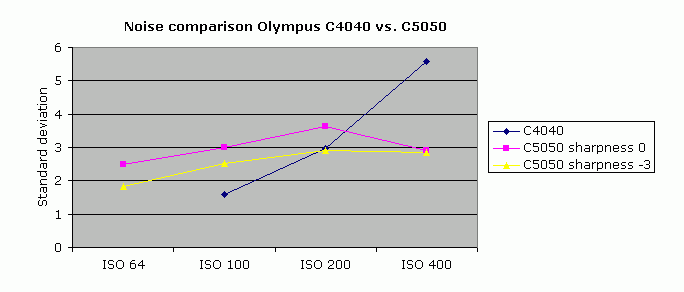
Ricola sweets box; macro shot without
flash
Here you'll find the results of a
brief test which compares the noise levels of the Olympus C4040 and C5050
digital cameras.
For questions or comments send me
an email.
Conclusions
Test procedure
I prepared a scene containing an objects with smooth, non-reflective surfaces with homogeneous colour and no texture.

Ricola sweets box; macro shot without
flash
I measured the noise in an image area with no texture and homogeneous colour.

In a noiseless image, the standard deviation in an area of homogeneous colour should be zero. Therefore, the higher the standard deviation, the bigger the noise.
With an Olympus C5050 I took a series
of shots at different ISO levels (ISO 64, 100, 200 and 400) and at sharpening
0 and -3. With the C4040 I took three shots at ISO 100, 200 and 400.
Olympus C-4040Z
|
Olympus C-5050Z
|
With the histogram function I measured the standard deviation in the noise measurement areas of each image. The results are shown in the graphs below.

In this test the C4040 has less noise
at ISO 100 than the C5050 at ISO 64 (slightly less) and sharpness -3. At
ISO 100 the C4040 has substantially less noise than the C5050 at ISO 100
and sharpness -3. However at ISO 200 noise in the C4040 increases sharply
and reaches the level of the C5050 (at sharpness -3). At ISO 400 the C4040
has substantially more noise than the C5050 (both at sharpness 0 and -3).
In other words the C4040 has a very
low noise at ISO 100, but a quite high noise at ISO 400. With the C5050
the noise increases sustantially less when the ISO increases (the curve
is considerably flatter).
Important note: noise was measured
in image areas containing no detail. The C5050 apparently applies a noise
reduction filter which flattens noise at ISO 400, but only in image areas
containing no details (see this page for more
information).
Back
to the Olympus 5050 online resource
© Copyright 2003 Alfred Molon